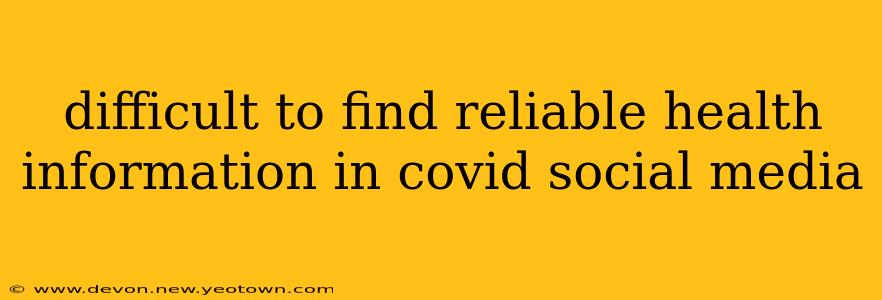Navigating the Noise: Why Finding Reliable Health Information During COVID-19 on Social Media is So Difficult
The COVID-19 pandemic threw the world into a whirlwind of uncertainty. One of the most challenging aspects was navigating the overwhelming flood of information – much of it unreliable – circulating on social media. It felt like a digital Wild West, where well-meaning but misguided posts sat alongside deliberate misinformation, making it incredibly difficult to find trustworthy health advice. Let's explore why this was (and still can be) such a problem.
Why is it so hard to find reliable health information about COVID-19 on social media?
This difficulty stems from a confluence of factors. Social media platforms, by their very nature, prioritize engagement. Sensational headlines, fear-mongering, and conspiracy theories often garner more clicks and shares than factual, evidence-based information. This creates a feedback loop where misinformation thrives and reliable sources are often drowned out.
Furthermore, the speed at which information spreads online far outpaces the careful process of scientific research and peer review. Preliminary findings, hypotheses, and even outright fabrications can go viral before experts have had a chance to verify them. This rapid dissemination of potentially inaccurate information contributed significantly to public confusion and anxiety.
What types of misinformation were common regarding COVID-19 on social media?
A wide range of misinformation plagued social media during the pandemic. Some of the most prevalent included:
- False cures and treatments: Numerous posts promoted unproven or even dangerous remedies, ranging from ingesting bleach to using certain essential oils. These claims often lacked any scientific basis and could have had serious health consequences.
- Conspiracy theories: The pandemic became fertile ground for conspiracy theories, with some claiming the virus was man-made or that the severity of the illness was being exaggerated. These narratives often undermined public health measures and fostered distrust in authorities.
- Misinformation about virus transmission: Incorrect information regarding how the virus spreads – whether it was airborne, how long it survived on surfaces, or effective prevention measures – fueled unnecessary fear and potentially risky behaviors.
- Misinterpretation of statistics: Data related to infection rates, mortality, and vaccine efficacy were often manipulated or presented out of context to support pre-existing biases or narratives. This selective presentation of data led to distorted understandings of the pandemic's reality.
How can I identify reliable sources of health information online?
Discerning reliable sources from unreliable ones requires critical thinking and a healthy dose of skepticism. Here's what to look for:
- Credible sources: Look for information from reputable organizations like the World Health Organization (WHO), the Centers for Disease Control and Prevention (CDC), and other national public health agencies.
- Evidence-based information: Reliable sources will cite scientific studies and research to support their claims. Be wary of information that lacks supporting evidence or relies on anecdotal accounts.
- Fact-checking websites: Websites like Snopes and PolitiFact can help you verify the accuracy of information you encounter online.
- Multiple sources: Don't rely on a single source. Consult several reputable sources to get a well-rounded understanding of the issue.
How can I protect myself from COVID-19 misinformation?
Protecting yourself from misinformation involves a multi-pronged approach:
- Be critical: Question the information you encounter online. Don't accept everything at face value.
- Verify sources: Check the credibility of the source before sharing information.
- Limit your exposure: Be mindful of the amount of time you spend on social media, particularly if you find yourself frequently encountering misinformation.
- Report misinformation: Most social media platforms have mechanisms for reporting misinformation. Use them to help combat the spread of false information.
The experience of navigating health information during the COVID-19 pandemic highlights the crucial need for media literacy and critical thinking skills in the digital age. By understanding the challenges inherent in finding reliable information online and employing strategies to verify its authenticity, we can better protect ourselves and others from the harms of misinformation.

